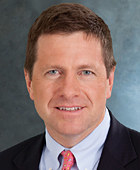[ad_1]

Category 5 Hurricane Felix over the Caribbean Sea in 2007.
NASA
During the presidential campaign, Donald Trump dismissed the risk man-made climate change poses to society, saying in March, “we have much bigger risks” facing the country.
But the president-elect’s choice to head the US Securities and Exchange Commission, attorney Jay Clayton, has done just the opposite, advising companies to come clean to investors about the risk that severe weather and other consequences of climate change will have on their bottom lines.
Last week, Trump announced he will nominate Clayton to chair the federal agency tasked with enforcing the nation’s securities laws.
“Jay Clayton is a highly talented expert on many aspects of financial and regulatory law, and he will ensure our financial institutions can thrive and create jobs while playing by the rules at the same time,” Trump said in a statement. “We need to undo many regulations which have stifled investment in American businesses, and restore oversight of the financial industry in a way that does not harm American workers.”
For at least the past six years, Clayton’s law firm, Sullivan & Cromwell, has advised businesses to disclose the “impacts of climate change” in documents they file with the SEC, according to a 2010 memo. The law firm listed Clayton as one of handful of attorneys that clients can turn to for advice on climate disclosure.

Sullivan & Cromwell
Back in 2010, the prospect that the United States would enact laws to curb the release of heat-trapping gases was real. At the time, Congress was debating legislation to do just that, and the SEC warned companies that any new regulation could affect their business.
As a result, the law firm listed for companies a litany of ways climate change — and action the world takes to address it — can affect them. They included “the devastating results of severe weather conditions,” “international treaties,” “federal and state legislation” and “increased demand for goods that results in lower greenhouse gas emissions.”
Whether the SEC under Clayton, if confirmed by the Senate, will continue to take climate change seriously is unclear. Trump has yet to say anything about the SEC’s climate disclosure guidance, and the president-elect’s transition team declined to comment to BuzzFeed News.
“That’s the big question mark,” Dave Anderson, policy and communications manager for the Energy and Policy Institute, the nonprofit watchdog that found the memo and other documents, told BuzzFeed News. “There are certainly a lot of other lawyers and law firms that the Trump transition team could have turned to” if it wanted to roll back the SEC’s guidance, he said.
Even if Clayton was of the law firm’s go-to lawyers on climate change, he is just one of some 800 lawyers employed there, environmental experts cautioned.
“That's not an indication one way or the other of whether individual lawyers at the firm agree with the law,” Michael Gerrard, an environmental law professor at Columbia, told BuzzFeed News, adding that the law firm “was being scrupulous in advising its clients on the state of the law.”
At least one company, an oil shipper called Crude Carrier Corporation, appears to have taken the advice on climate change from Clayton.
When the company went public in 2010, Crude Carrier told potential investors that the “passage of climate control legislation or other regulatory initiatives … that restrict emissions of greenhouse gases could require us to make significant financial expenditures,” in an SEC filing.
Clayton’s name, along that of one other lawyer, appears at the top of that document.
Even if the SEC under Clayton no longer tells companies to disclose climate risk, it may not mean much for businesses. Though the commission is investigating at least one company, Exxon Mobil, over how it factors climate risk into its projects, the SEC has taken almost no enforcement action since 2010.
“I can’t imagine it being a priority as far as things he wants to do at the SEC,” Gretchen Goldman, research director for the Center for Science & Democracy at the Union of Concerned Scientists, told BuzzFeed News. “It’s guidance, it’s not a formal rule, so some companies have chosen to ignore it.”
LINK: Under President Trump, What Will Happen To Climate Policy?
LINK: Attorneys General Will Investigate Energy Firms For Climate Deception
[ad_2]
